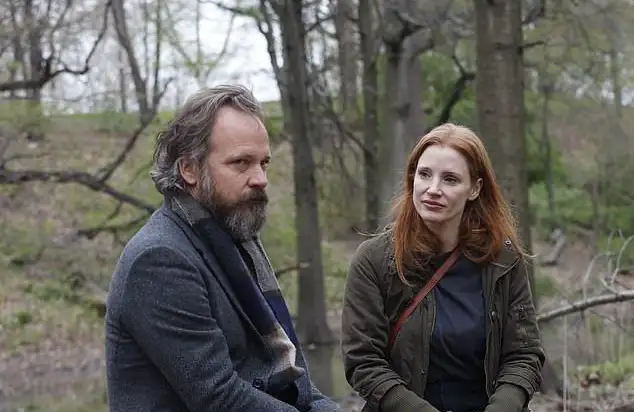Michel Franco’s Memory is a superb exploration of human connection after trauma, but it’s its moral gray areas that make it such a philosophically compelling film.
A lot has been written about Michel Franco’s Memory ever since its premiered at the Venice Film Festival earlier this year. Even though the film itself was pretty divisive, what most seem to agree about the excellent performances and thought-provoking themes behind it. To me, Michel Franco’s Memory was not only one of the most surprising movies of 2023, but also one of the most philosophically compelling ones, due to the moral gray areas it explores.
The film is set in New York City, and the first character we meet is Sylvia (Jessica Chastain, of The Good Nurse). At an AA meeting that she’s attending with her daughter Anna (Brooke Timber), we learn that Sylvia has been sober 13 years — the same age as her daughter Anna (Brooke Timber). Not long after that, Sylvia reluctantly attends a high school reunion, where she feels completely out of place. She spends most of the time sitting at a table on her own, until a man comes over, sits a little too close to her, and stares at her intently, in a very disquieting way. Without saying a word, Sylvia gets up and leaves the party, rushing to get the subway. But the stranger follows her home, and the following morning he’s still there, sleeping on the ground and soaked wet from the rain.
Sylvia asks the stranger for his wallet, learns that his name is Saul (Peter Sarsgaard of The Lie), and calls a relative of his to let them know what happened. Soon, said relative, Isaac (Josh Charles, of The Good Wife), shows up, explaining that his brother has early on-set dementia. While this partly explains what happened the night before, Memory has a lot of surprises in store for us, including various revelations about Sylvia and Saul’s pasts. This won’t be the last time the two strangers meet, and the closer they get to one another, the more philosophically intriguing the film becomes. But what are the moral gray areas explored by Memory? Let’s take a look at some of them. Spoilers below!
Memory and Forgiveness: Who Are We Without Our Memories?

From the moment we meet Saul, Memory asks a question that most films that deal with illness delve into. If memories are what make us who we are, what happens when we lose them? Are we still the same person or are we someone else? But if that question wasn’t interesting enough in itself, Michel Franco takes it one step forward, by introducing a traumatic event from Sylvia’s past that Saul may or may not have been involved in.
After that first meeting, Sylvia and Saul spend some time alone in a park, and that’s when we get the first shocking reveal of the movie. Sylvia tells Saul that she remembers him from school, as he was one of the boys who sexually abused her when she was a teenager, to which he replies that he doesn’t remember. Later in the film, whether this actually happened or not comes into question — another clever move from Michel Franco, who has us second guessing the moral integrity of his characters throughout the entire film — but in this first scene, it doesn’t matter. What matters is the question that pops into our head the moment we learn about the abuse.
How can this seemingly innocuous man have committed such a despicable act? Should the person in front of us be held accountable for these actions, even if the man who committed them was a different version of himself that has already been wiped from existence by dementia? And more importantly, does Saul deserve to be forgiven?
Memory goes on to explore different themes later in the film, but this first conversation between Sylvia and Saul is one of the many compelling moral gray areas of the movie. What would we have done in Sylvia’s place? This is the question that’ll haunt us throughout the entire film, and we won’t always have a definitive answer to it.
Family Ties and Generational Trauma: The Choices Characters Make in Memory

Another interesting aspect of Memory is what happens around our protagonists, more specifically when it comes to Sylvia’s sister Olivia (Merritt Weaver) and Saul’s brother Isaac, but also to Sylvia’s relationship with her own daughter and estranged mother.
Olivia is a particularly interesting character, not only because of her relationship with Sylvia, but also because, when her sister is at work (as a social worker), Sylvia’s daughter Anna often stays with her. Not long into the movie, Isaac asks Sylvia if he can pay her to look after Saul some afternoons, as Saul seems to be really taken with her. When Sylvia agrees, Anna starts spending even more time with Olivia. Soon, Sylvia finds out that her sister let Anna interact with their mother, Samantha (Jessica Harper), with whom Sylvia isn’t on speaking terms. At some point, Anna asks Samantha why that is, and the latter bluntly tells her that Sylvia used to make things up all the time as a teenager, including having been sexually abused.
Right there and then, we realize just how toxic a person Sylvia’s mother is, and how hard it must have been for her and her sister as teenagers. But we are also given the tools to understand what happens later, when the main confrontation of the film takes place and we realize not only the extent of the abuse Sylvia endured, but also that Olivia was aware of what was going on, and never said anything. This places Olivia into a moral gray area of her own: on one hand, she made Sylvia’s life so much more difficult by not speaking up; on the other hand, growing up in such a toxic family can’t have been easy for her either, and we understand just how scared and confused she must have been.
With the truth about Sylvia’s past also comes a better understanding of her relationship with her own daughter Anna, as Sylvia is an extremely protective mother, so much so that her daughter can’t really do anything. Even though Anna is an incredibly patient person, and seems to have just passively accepted that her mother will never allow her to date and go to parties, we can’t help but wonder about what her future will be like. Of course, we don’t blame Sylvia for being so protective, given what she’s been through; but Anna is her own person, and by not letting her make experiences of her own, Sylvia is responsible for her daughter growing up with her own share of trauma.
Another gray character in Memory is Isaac, a man who undoubtedly does love his brother, but who also makes some questionable choices throughout the film. When Sylvia and Saul start getting close, Isaac understands that they’re romantically involved and doesn’t react well, forbidding Sylvia from coming back to the house and seeing his brother. When Saul decides to live with Sylvia, Isaac blocks his credit cards, making life even harder for his brother. At some point, we understand just how hard it is to care for someone with dementia, as Saul has the tendency to forget things and get lost, so part of us knows that Isaac is more familiar with the challenges of caring for him than Sylvia is, and that his actions are ultimately for his own good.
But there’s also a part of us that can’t help but wonder if Isaac might be a little jealous of Sylvia, resenting her not only for taking his brother away from him, but also for how much easier she has it, since Saul is so much more present and collaborative with her than he is with him. And how can we blame him? Jealousy is a powerful human emotion, and it can’t have been easy for Isaac to have spent years caring for his father while also looking after his niece (Elsie Fisher).
So what can we learn from siblings and parents’ behavior in Michel Franco’s Memory? That dealing with trauma, abuse, and illness isn’t easy, not only for the ill and the abused but also for those around them, and that we can’t judge someone for the choices they make when they’re at their worst, because sometimes, it’s a matter of survival. Many of Michel Franco’s characters are morally flawed at best, but the writer-director never judges them, right till the very end, as if we were in their position, we’d probably be making the same decisions.
Symmetry and Moral Grey Areas in Sylvia and Saul’s Relationship

Sylvia and Saul’s relationship is at the very core of Michel Franco’s Memory, and it’s also what makes a film about degenerative illness and sexual abuse such a heartwarming, endearing watch despite its heavy themes. When our two protagonists start hanging out with each other, we immediately realize that there’s a symmetry to their relationship that only exists because of how broken they are. It’s due to his dementia that Saul can react to the news of Sylvia’s sexual abuse, and his potential involvement in it, in a matter-of-fact way. Like Saul, Sylvia is a victim of circumstances she couldn’t control — Saul’s are his illness and Sylvia’s the abuse she endured, but that’s what allows her to see Saul as an equal and not let her attitude toward him be altered by pity.
At the same time, their relationship is also very interesting philosophically speaking, especially when it comes to why Sylvia wants to be with Saul. Since Saul suffers from dementia, things are only going to get worse for him as his titular “memory” continues to fade. This means that, eventually, the man will forget about it all and she will suffer as a result. And hasn’t Sylvia suffered enough? Why would she want to enter a relationship with someone who’s soon going to forget about her?
Perhaps, this is precisely the reason why Sylvia feels comfortable with Saul. From the beginning of the movie, we learn that Sylvia is afraid of sharing spaces with men, so much so that she even struggles to let a man come into her home to repair her fridge, reminding him that she had specifically requested a woman. Saul does a lot more than share a space with her when the two of them meet, and yet she’s somehow able to overcome all of that and even spend entire afternoons with him, alone in his house.
Their mutual recognition of their respective trauma certainly plays a role in this, but I can’t help but wonder if Sylvia might also find comfort in the fact that their relationship is destined to soon come to an end. It can be terrifying to commit to a serious relationship — and one that also involves looking after someone who’s prone to erratic behaviour — if you’ve been afraid of men and relationship your entire life. But if the relationship comes with a time limit, it suddenly becomes not only less daunting, but also kind of a relief. Which would make Sylvia’s motives a little selfish, but also incredibly human.
These are only some of the moral gray areas explored by Michel Franco in Memory, a film that’s so dense with themes and ideas that each watch comes with a new thought-provoking perspective on life, family, illness, trauma, love, and many more issues. Memory is not just a superbly acted movie that surprises you from start to end, but it’s also a philosophically intriguing watch. Michel Franco places us in his character’s shoes and asks us what we’d do if we were them, and the answer is that it’s not that simple.
Memory will be released in select US theaters on December 22, 2023, and nationwide on January 5, 2024.

